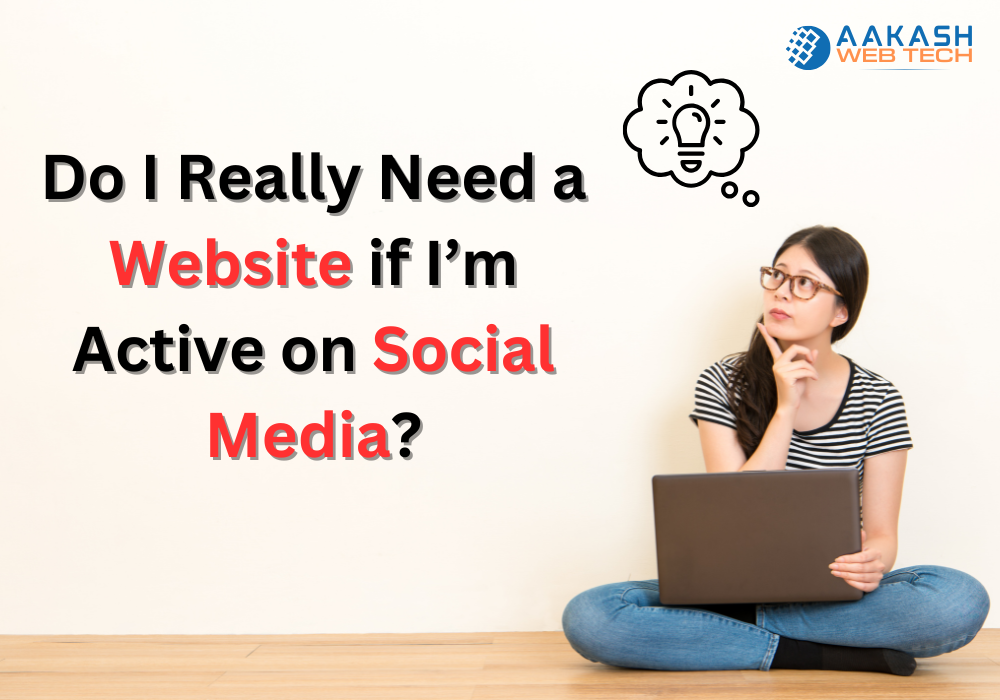With the rise of social media, many businesses are now questioning the need for a website. It’s understandable—if you’re already active on social media, interacting with customers, and sharing updates, why go through the additional expense and effort of building a website? But the truth is, a website offers unique advantages that social media alone simply can’t provide. Let’s explore why having a website is essential for any business, even if you have a strong social media presence.
Control and Ownership
One of the most significant differences between social media and a website is the level of control. While you may manage your social media page, you don’t own it. Social media platforms can change their policies, adjust algorithms, and even suspend accounts without notice. This lack of control can be risky. For example, if a platform like Facebook or Instagram suddenly limits your reach through an algorithm change, your posts may not reach the majority of your followers. Even worse, if your account is ever flagged or hacked, it can be suspended or deleted, cutting off your connection with your audience entirely.
A website, on the other hand, is your asset. You have complete control over its design, content, and user experience. This gives you the freedom to structure the website to meet your business goals without worrying about a third party’s policies. With a website, your brand’s online presence is stable and fully under your control.
Trust and Credibility
Trust is essential in today’s digital marketplace. For many people, a business without a website may come across as less professional or even untrustworthy. A well-designed website shows customers that your business is established and reliable. It signals that you’re serious about what you offer, which can make a big difference in convincing potential customers to choose you over competitors.
Furthermore, a website allows you to showcase customer testimonials, display certificates or awards, and provide in-depth information about your business that might not fit well on a social media profile. When people search for information about your business online, a website often appears as the most credible source, giving potential customers more confidence in your brand.
SEO and Visibility
Social media is excellent for engagement and spreading awareness, but it doesn’t contribute significantly to search engine optimization (SEO). Websites, however, are indexed by search engines like Google, allowing them to appear in relevant search results. SEO is one of the most effective ways to increase visibility, as people searching for products or services like yours can discover your website even if they’ve never heard of your brand before.
On a website, you have the flexibility to optimize for SEO with keywords, meta tags, image alt text, and backlinking strategies. This improves your chances of appearing at the top of search results, bringing in organic traffic that you wouldn’t receive solely through social media. With consistent SEO efforts, your website can become a valuable tool for generating new leads and reaching a broader audience.
Flexibility in Content and Design
When it comes to showcasing your brand’s unique qualities, social media can be limiting. Every social platform has a specific layout and set of guidelines that you must follow, which means your profile will always look similar to everyone else’s. While you can personalize your posts, the overall structure of your page is dictated by the platform. A website, in contrast, allows for complete creative freedom.
With a website, you can choose everything from the layout to the color scheme, making it a true reflection of your brand. You can design a user experience that aligns with your business’s goals, whether that’s driving purchases, encouraging sign-ups, or providing information. Additionally, websites offer a space for long-form content like blogs, resources, and FAQs, which can provide in-depth value to visitors while improving your SEO.
Building Your Email List
While social media platforms allow you to interact with followers, they aren’t ideal for building direct contact lists, such as emails. An email list is one of the most effective tools in digital marketing. With it, you can communicate directly with your audience, bypassing the unpredictability of social media algorithms.
A website makes it easy to capture emails through sign-up forms, pop-ups, or exclusive content offers. Once a visitor signs up, you can send them personalized updates, offers, or newsletters, creating a more intimate connection than social media typically allows. This level of direct contact can lead to increased engagement and higher conversion rates.
Sales and E-commerce Potential
If your business involves selling products or services, a website can streamline this process in ways that social media cannot. Although some social media platforms offer shopping features, these are often limited and don’t allow for as much customization or integration with payment gateways. Having an e-commerce website lets you manage the entire shopping experience, from browsing to checkout, all under your brand’s identity.
A website also provides more flexibility to personalize recommendations, upsell, and create a seamless user journey. Features like a shopping cart, customer reviews, and secure checkout options make it easy for customers to make purchases and for you to manage orders efficiently. With the right e-commerce setup, your website can become a powerful sales tool that social media alone can’t replace.
Analytics and Insights
Social media platforms provide basic metrics, such as likes, comments, and shares. However, a website offers much more detailed analytics that allow you to understand your audience better. With tools like Google Analytics, you can track page views, time spent on each page, bounce rates, and conversion paths, giving you a comprehensive view of user behavior.
This data is invaluable for making informed business decisions. By understanding what content and products engage visitors the most, you can refine your marketing strategies and improve your website’s effectiveness. Unlike social media, where you only get limited insights, a website lets you own the data, which can help you achieve your business objectives more effectively.
Backup in Case of Social Media Issues
Another significant reason to have a website is to act as a safety net for when things go wrong on social media. Whether it’s an unexpected outage, a hacked account, or a policy change, relying solely on social media can leave you vulnerable. By having a website, your customers always have a place to reach you, ensuring continuity in communication and customer service.
Additionally, social media trends change rapidly. Platforms that are popular today might lose relevance tomorrow. A website serves as a stable online presence that won’t be impacted by shifting social media trends, making it a long-term investment in your business’s digital strategy.
The Hybrid Approach: Leveraging Both
The best digital strategy often involves a combination of social media and a website. Social media can drive traffic to your website, while your website can offer exclusive resources and insights for your social media followers. This hybrid approach reinforces your brand presence, increasing visibility and making it easy for customers to engage with you on multiple platforms.
By connecting your social media and website, you create a comprehensive digital ecosystem. You can post shorter, engaging content on social media to capture attention, then guide followers to your website for more detailed information, products, or services. This approach not only strengthens your brand but also makes your digital presence more resilient and adaptable.
Conclusion
While social media is an excellent tool for engagement and brand visibility, it can’t replace the unique benefits of a website. A website gives you control, credibility, and flexibility, helping you build a direct relationship with your customers and supporting your long-term goals. If you’re serious about your business, consider a website as a crucial part of your digital strategy. With both a website and an active social media presence, you’ll be well-positioned to reach your audience, build trust, and grow your brand in today’s competitive online landscape.
So, if you’re wondering whether to invest in a website, the answer is clear. A website is not just an option; it’s a valuable asset that complements social media and strengthens your business’s digital foundation.

